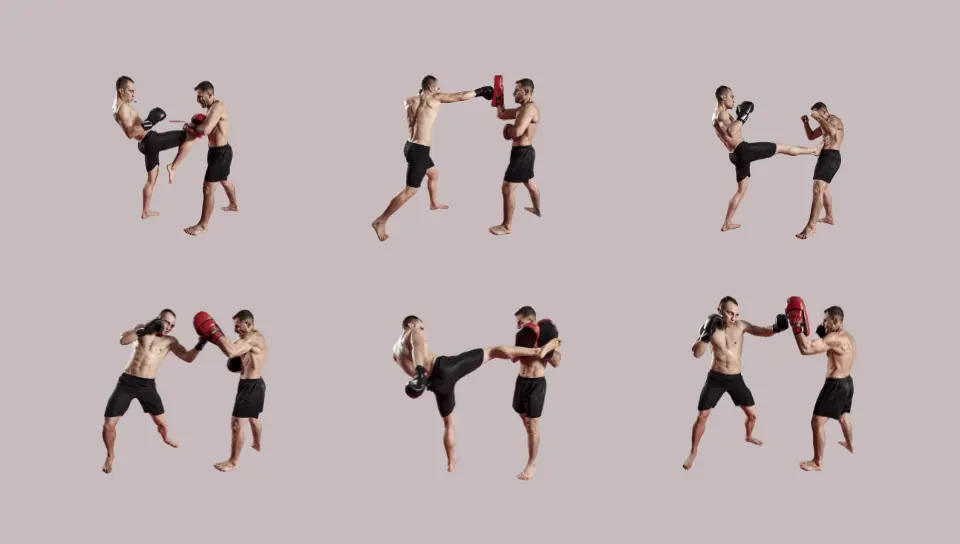Muay Thai Strikes
Learn 09 Muay Thai strikes in a didactic and objective way in this illustrated guide to Muay Thai moves.
Here are ten commonly used Muay Thai moves:
- Jab – a quick, straight punch that comes from the lead hand.
- Cross – a powerful punch that comes from the rear hand.
- Hook – a punch that is thrown in a looping motion.
- Uppercut – a punch that is thrown upwards, usually aimed at the chin.
- Roundhouse kick – a powerful kick that comes from the rear leg, aimed at the ribs or head.
- Teep – a front kick that is used to push an opponent away or disrupt their balance.
- Knee strike – a strike that is delivered with the knee, usually aimed at the body or head.
- Clinch – a grappling technique that involves holding an opponent in close range and striking with the knees.
- Elbow strike – a strike that is delivered with the elbow, usually aimed at the head or body.
1) Jab in Muay Tay
One of the most important techniques in Muay Thai is the jab, which is a quick, straight punch thrown with the lead hand. Here is a step by step guide on how to perform the jab in Muay Thai:
- Start in a fighting stance: Stand with your feet shoulder-width apart and your dominant foot slightly behind your lead foot. Your knees should be slightly bent and your weight should be evenly distributed.
- Hold your hands up: Keep your hands up in front of your face with your elbows tucked in. Your lead hand should be slightly lower than your rear hand.
- Extend your lead hand: Quickly extend your lead hand forward, keeping your elbow tucked in and your wrist straight. Your punch should be aimed at your opponent’s face or chest.
- Rotate your hips: As you punch, rotate your hips and pivot your lead foot to add power to the strike.
- Recoil your punch: Immediately after landing the punch, quickly bring your hand back to your face to protect yourself.
Here are a few tips to keep in mind when practicing the jab:
- Keep your punch quick and snappy
- Maintain good balance throughout the movement
- Practice throwing the jab from different angles and distances

2) Croos in Muay Thai
Cross in Muay Thai, also known as a straight punch, is one of the fundamental techniques in Muay Thai. It is a powerful punch that involves punching with the dominant hand in a straight line towards the opponent’s body or face.
Here are the steps to perform a cross in Muay Thai:
- Start in a fighting stance with your feet shoulder-width apart and your dominant foot slightly behind the other foot.
- Keep your hands up, elbows close to your ribs, and fists in front of your face.
- Rotate your hips and pivot your back foot as you extend your dominant arm towards your opponent, keeping your elbow close to your body.
- As you punch, turn your fist clockwise and aim for your opponent’s chin or chest.
- After punching, quickly retract your arm back to your guard position.
It is important to keep your other hand up to protect your face and body while executing the cross punch.
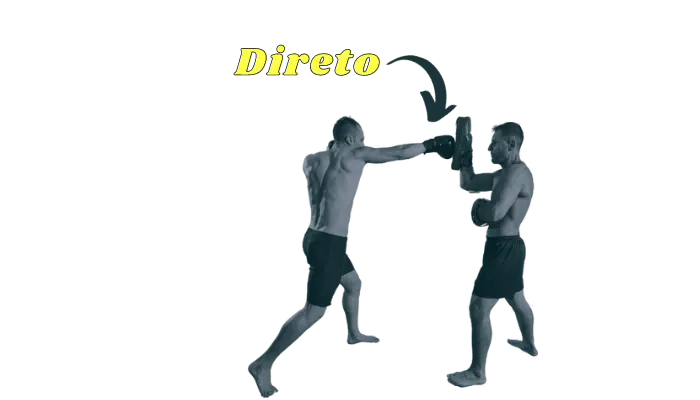
3) Hook in Muay Thai
The hook in Muay Thai is a fundamental punch in Muay Thai that is used to strike an opponent’s head or body from the side. Here is a step-by-step guide on how to execute a hook punch in Muay Thai:
- Start in the fighting stance: Begin with your feet shoulder-width apart, one foot slightly in front of the other. Your knees should be slightly bent and your weight should be distributed evenly between both feet. Keep your hands up, with your lead hand (the one on the same side as your front foot) slightly higher than your rear hand.
- Rotate your hips: To generate power for the hook, pivot your lead foot and rotate your hips in the direction of the punch. This will allow you to transfer your body weight into the punch.
- Raise the elbow: while rotating the hips, taking the main elbow back. This will help you generate more power and set up the angle for the punch.
- Punch from the side: From the position of the raised elbow, punch forward in a diagonal arc, aiming for your opponent’s head or body. Make sure to keep your wrist straight and your thumb on top, and pivot your rear foot to help generate more power.
- Recoil: After making contact with your opponent, quickly bring your punch back to your starting position. This will help you avoid counterattacks and prepare for your next move.
Some additional tips for executing a hook punch in Muay Thai include keeping your chin tucked to protect your jaw, keeping your eyes on your opponent at all times, and exhaling forcefully as you punch to help you generate more power.
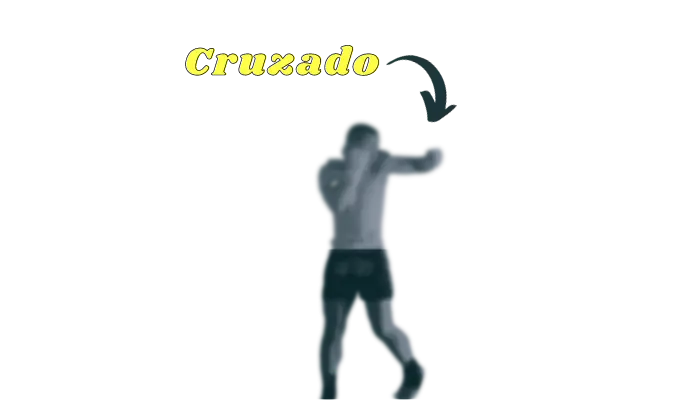
4) Uppercut in Muay Thai
The uppercut is a powerful punch used in Muay Thai that can be executed with either hand. It is usually thrown at close range and targets the opponent’s chin or solar plexus. Here are the steps to execute an uppercut:
- Start in a proper stance: Stand with your feet shoulder-width apart, knees slightly bent, and your weight evenly distributed on both feet. Your dominant foot should be slightly behind the other.
- Bring your hand down: Drop your hand down to your waist, keeping your elbow in close to your body.
- Rotate your hips and shoulders: Rotate your hips and shoulders towards your opponent, generating power for the punch.
- Bring your hand up: As you rotate, bring your hand up towards your opponent’s chin or solar plexus, keeping your elbow tucked in.
- Connect with your punch: Thrust your arm upwards, extending your elbow and striking your opponent with your fist.
- Follow through: After you connect with your punch, continue to rotate your hips and shoulders to follow through with the punch.
Some key points to keep in mind when throwing an uppercut include keeping your non-punching hand up to guard your face, keeping your weight balanced, and keeping your movements smooth and fluid.
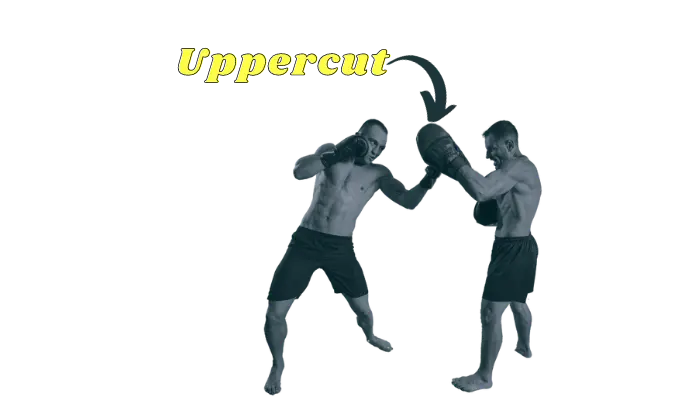
5) Teep in Muay Thai
The teep, also known as the push kick, is a fundamental technique in Muay Thai that involves using the foot to push an opponent away or off balance. Here is a step by step guide on how to perform the teep:
- Start in a fighting stance with your lead (front) foot slightly forward.
- Lift your rear (back) foot off the ground and bend your knee towards your chest.
- Extend your leg forward, keeping it straight and pushing your foot towards the target.
- Make contact with the ball of your foot or the bottom of your toes, depending on your preference.
- Recoil your leg back to its original position.
It’s important to note that the teep can be used for a variety of purposes, including keeping distance from an opponent, disrupting their rhythm, or attacking their legs or body.
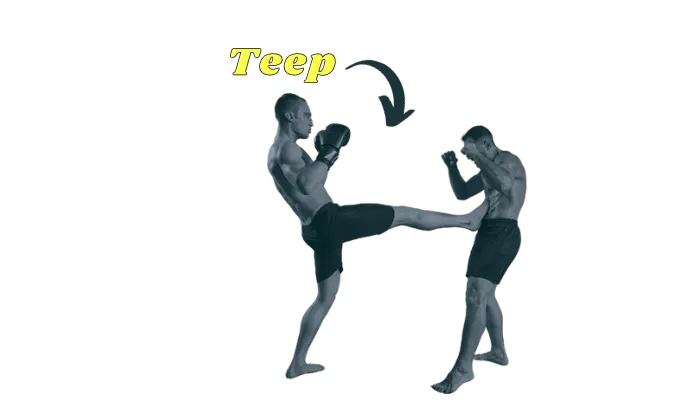
6) Roundhouse kick in Muay Thai
The Roundhouse kick is one of the most powerful and popular kicks in Muay Thai. Here are the step-by-step instructions on how to execute it:
- Start in your fighting stance with your feet shoulder-width apart.
- Pivot on your lead foot and lift your rear foot off the ground, turning your hips and shoulders along with your pivot.
- Swing your rear leg across your body, aiming for your opponent’s midsection or head.
- At the last moment, snap your leg out, hitting your target with the shin or instep.
- Quickly return to your fighting stance.
It is important to note that proper technique and practice are essential to avoid injury and maximize the power of the kick. It is also important to vary the height and speed of the kick to keep your opponent guessing.
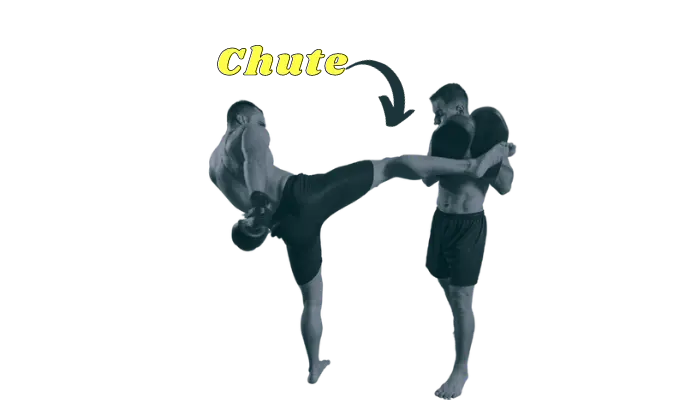
7) Knee strike in Muay Thai
The knee strike is a fundamental technique in Muay Thai and is used in both offensive and defensive situations. Here is a step by step guide on how to execute a knee strike in Muay Thai:
- Start in a fighting stance with your dominant leg behind you.
- Step forward with your lead leg and lift your knee up to your opponent’s body.
- Drive your hip forward to generate power and push off your back foot to add more force.
- Strike your opponent with the bony part of your knee, aiming for their stomach, ribs, or head.
- Immediately return to your fighting stance and be ready for your opponent’s counterattack.
It’s important to note that proper form and technique are crucial to executing a knee strike effectively.
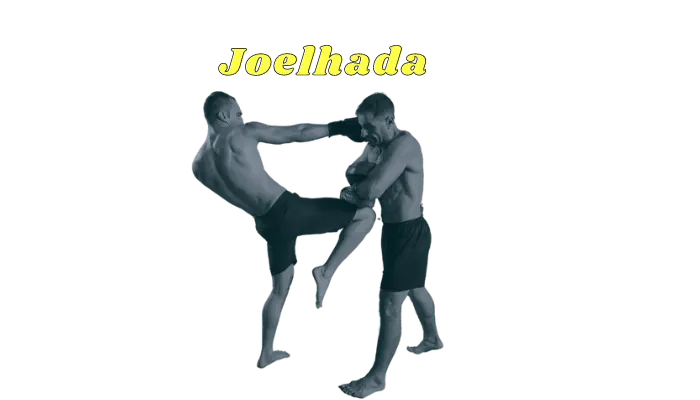
8) Elbow strike in Muay Thai
The elbow strike is one of the most devastating and lethal techniques in Muay Thai. It can be used to cause serious damage to the opponent’s face, head, and body. Here is a step-by-step guide on how to execute the elbow strike in Muay Thai:
- Start with a proper stance: Stand with your feet shoulder-width apart, and your knees slightly bent. Keep your hands up to protect your face, and your elbows close to your body.
- Choose your target: The elbow strike can be used to hit the opponent’s face, head, or body. Decide where you want to hit your opponent before you strike.
- Raise your elbow: Lift your elbow up and back, keeping it close to your body. This will generate power for your strike.
- Rotate your body: Rotate your hips and shoulders in the direction of your strike. This will add more power to your elbow strike.
- Strike with your elbow: Bring your elbow down and forward, striking your opponent with the point of your elbow. Aim for your target with accuracy and precision.
- Follow through: After you strike, keep your elbow close to your body and follow through with your rotation. This will help you generate more power and protect yourself from counterattacks.
It is important to note that the elbow strike is a dangerous technique, and should only be used in self-defense or in sanctioned fights. It requires proper training and technique to execute it safely and effectively.
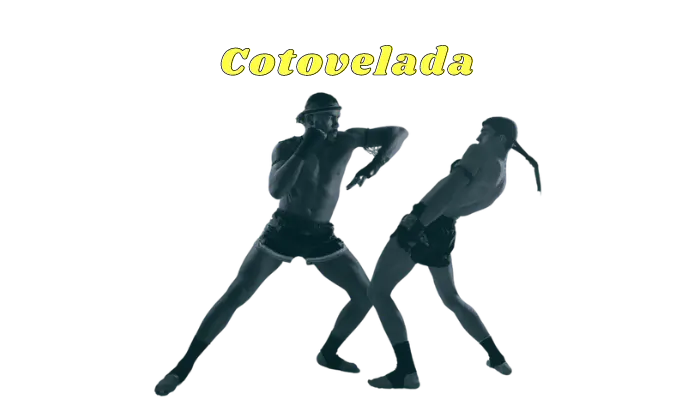
9) Clinch in Muay Thai
The Clinch, also known as the clinching technique, is a vital part of Muay Thai. It is a grappling technique that is used to control and strike an opponent in close range. Here are the steps to perform the Clinch in Muay Thai:
- Closing the distance: The first step is to close the distance between you and your opponent. This can be done by stepping forward or by using a combination of punches and kicks to get close.
- Positioning: Once you are in close range, you need to position yourself correctly. You should place one arm around your opponent’s neck, and the other arm behind their back. Your head should be tucked in close to your opponent’s shoulder.
- Control: The next step is to control your opponent’s movement. You can do this by pulling them towards you and using your body weight to keep them off balance. You can also use your knees to strike your opponent’s legs or body.
- Attack: While in the Clinch, you can also attack your opponent. You can use your elbows to strike their head, body or legs. You can also use your knees to strike their body or legs.
- Defense: It is important to be aware of your opponent’s attacks while in the Clinch. You should be ready to defend against their strikes by blocking or evading.
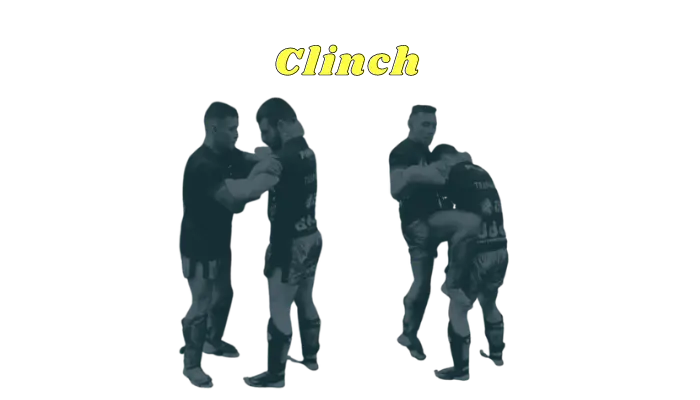
Defense in Muay Thai
The main defense fundamentals of Muay Thai include footwork, blocking, parrying, and evasion.
Footwork in Muay Thai
Footwork is crucial in Muay Thai because it allows you to move in and out of range quickly and efficiently. Good footwork enables you to evade incoming strikes and create angles for your own attacks.
Blocking in Muay Thai
Blocking and parrying are also essential defense techniques in Muay Thai. Blocking involves using your arms to absorb or deflect incoming strikes, while parrying involves redirecting an opponent’s attack away from your body.
Evasion in Muay Thai
Evasion is another important defense fundamental in Muay Thai. This technique involves moving your body out of the way of incoming strikes, rather than absorbing or deflecting them. Evasion is particularly effective against powerful strikes, such as roundhouse kicks or punches.
More Content about Muay Thai
- History of Muay Thai
- Muay Thai Rules
- Meaning of the Word Muay Thai
- What is Muay Thai?
- Muay Thai Moves
References
CAIO Nunes Muay Thai. O chute frontal (Teep) do Muay Thai passo a passo. YouTube, 05 de novembro de 2019. Disponível em: https://www.youtube.com/watch?v=gBkiVWPoPgE. Acesso em: 26 de setembro de 2023.
CAIO Nunes Muay Thai. Chute do Muay Thai – O passo a passo do chute circular médio. YouTube, 28 de maio de 2019. Disponível em: https://www.youtube.com/watch?v=aspzJCAzv1g. Acesso em: 28 de setembro de 2023.
CAIO Nunes Muay Thai. Joelhada do Muay Thai passo a passo. YouTube, 09 de abril de 2019. Disponível em: https://www.youtube.com/watch?v=9onaHbNyMCA. Acesso em: 28 de setembro de 2023.
CAIO Nunes Muay Thai. Aprenda a cotovelada do muay thai. YouTube, 14 de maio de 2019. Disponível em: https://www.youtube.com/watch?v=A3-6SjBSi-g. Acesso em: 30 setem de 2023.
CAIO Nunes Muay Thai. CLINCH DO MUAY THAI: O guia completo do iniciante. YouTube, 21 de maio de 2019. Disponível em: . Acesso em: https://www.youtube.com/watch?v=Rz86jtlj6ZI 30 setembro de 2023.
CAIO Nunes Muay Thai. Maneiras de utilizar o jab no Muay Thai – com Pipa Jocky Gym | Recorte Muay Thai Para Todos #18. YouTube, 21 de maio de 2019. Disponível em: https://www.youtube.com/watch?v=UeDTgyAU2bE . Acesso em: 30 setembro de 2023.
READY to Fight. Qual a diferença entre gancho e uppercut? YouTube, 06 de outubro de 2020. Disponível em: https://www.youtube.com/watch?v=sNA3YDjn9fM. Acesso em: 30 setembro de 2023.
CAIO Nunes Muay Thai. Aprenda tudo sobre o cruzado do Muay Thai e suas diferenças para o Boxe. YouTube, 29 de janeiro de 2019. Disponível em: https://www.youtube.com/watch?v=eSKv3DIsqus. Acesso em: 30 setembro de 2023.
CAIO Nunes Muay Thai. Defesa no Muay Thai: Entenda as diferentes classes de fundamentos. YouTube, 02 de abril de 2019. Disponível em: https://www.youtube.com/watch?v=DTN8xTlivFI. Acesso em: 30 setembro de 2023.
